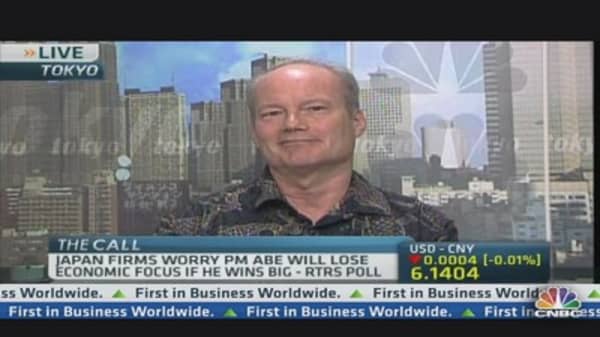Japan's benchmark index was dragged down by 1.7 percent loss in market heavyweights Fast Retailing and Fanuc. Exporters also ignored a weaker yen, which hit a new seven-week low against the greenback around the 100.8 handle.
Traders attributed the sudden bout of volatility to profit-taking ahead of Sunday's election that sparked large scale selling of stock futures.
"The move down took a lot of people by surprise but what we've been worried about all week is that the level of optimism in the market is way too high," said Ben Collett, head of Asian equities at Sunrise Brokers.
The sell-off comes ahead of Sunday's election to the upper house of parliament. According to Reuters, opinion polls show Prime Minister Shinzo Abe's ruling coalition on track for a clear victory, which would strengthen his economic strategy known as "Abenomics."
(Read more: What Sunday's Japan election means for Abenomics)
"The markets are forward thinking. Let's assume he [Abe] wins a massive majority. What else have you got for markets in the month of August? Not a whole lot. This is a forward thinking move to say 'I've made my money this month so I'm out of here,' Collett added.
Sydney loses 0.4%
Australian stocks tracked the Nikkei's losses and retreated further from the 5,000 level, which it briefly crossed in early Asian trade. Resource stocks fell, even as as iron ore prices rose to $131.90 a tonne. Global miners BHP Billiton and Rio Tinto fell 1 percent each.
Oil and gas producer Santos lost 3.6 percent after reporting a 5 percent dip in second-quarter output and warned of a 3 percent reduction in 2013 production guidance.
The next barrier for the benchmark index to cross will be 5,012 points, which would mark a new a one-week high.




